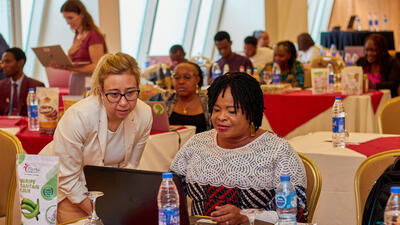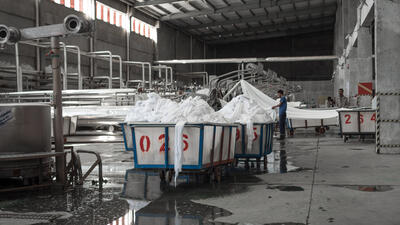ITC focuses on partnerships, innovation and responding to countries’ individual needs
Addressing the International Trade Centre (ITC)’s annual Joint Advisory Group (JAG) meeting, Ms. Patricia R. Francis, Executive Director of ITC, spoke about ITC’s focus on building partnerships with beneficiaries and other trade-related technical assistance agencies, and on developing innovations in delivering services in accordance with countries’ needs to the benefit of small-and medium-sized exporters. This is being undertaken, said Ms. Francis, at the same time as ITC continues to improve its effectiveness and efficiency.
Ms. Francis also emphasized that in 2011, ITC exceeded its target of USD 44 million in delivery of trade-related technical assistance, reaching USD 47.8 million. ‘In scaling up our delivery, we have done so mainly through our large programmes which have higher potential impact on the ground, while at the same time lowering transaction costs,’ said Ms. Francis. She noted in particular the EnACT Programme which works toward employment for youth and women in the Arab region; PACT II (Programme for Building the Capacity for African Trade) which aims to increase regional integration through trade in sub-Saharan Africa; NTF II (the Netherlands Trust Fund) Programme which is developing sectors in five countries; and the AAACP’s (All ACP Commodities Programme) strengthening of trade support institutions (TSIs).
Building partnerships is key to achieving success in projects and programmes, said Ms. Francis. She said that ITC is working with the World Trade Organization (WTO), the United Nations Conference on Trade and Development (UNCTAD), the World Bank and the World Economic Forum to expand its reach of global public goods and promoting greater transparency in trade information in an effort to build confidence and understand markets. Ms. Francis also spoke about ITC’s partnerships with the Enhanced Integrated Framework (EIF), the Centre for the Promotion of Imports in the Netherlands (CBI) and UN agencies to deliver in the area of tourism, agriculture/agribusiness and the green economy.
ITC’s innovations are necessary to respond to challenges and opportunities of the volatile economic environment, said Ms. Francis. ‘ITC continues to work on reinventing its services, to be able to offer the right response to its clients’ needs in this changing environment,’ she said. In particular, ITC will be developing new innovative solutions such as: trade in services; programmes tackling youth unemployment; the next generation of programmes on regional integration and intraregional trade; intellectual property rights and branding as a means to bring more value; and expansion of e-Learning to build capacities remotely before providing value-added services locally.
Ms. Francis said that in order to match the delivery of the previous biennium, ITC requires at least USD 14 million this year and next to replenish funding for large projects, and that, over time, ITC is looking to raise USD 50 million or more annually. Ms. Francis also thanked JAG members for their ongoing support.
The Director General of the WTO, Mr. Pascal Lamy, focused on four priority areas where, he said, ITC can play a key role in the next years: trade facilitation; Aid for Trade and global and regional value chains; issues related to least-developed countries; and regional integration. Mr. Lamy also spoke about two issues that he said were crosscutting, saying first, ‘ITC continues to do exemplary work on women and international trade, which must be seen as an issue within all facets of ITC’s work.’ The second crosscutting issue mentioned by Mr. Lamy was ITC’s focus on improving its efficiency and effectiveness, saying, ‘I also want to commend ITC for the work it has been doing internally to improve its priority setting and programme delivery.’
The Secretary General of UNCTAD, Dr. Supachai Panitchpakdi, said that it is a difficult time for developing and developed countries alike, and stressed the need of new ways of thinking for alternative solutions. Referring to ITC’s strategic plan, he said that he was particularly pleased with ITC’s focus on mainstreaming inclusive and sustainable development, saying, ‘Export growth is not an end in itself.’
The Chair of the 46th JAG, H.E. Mr. Francisco Pirez Gordillo, Ambassador, Permanent Representative to the WTO, Permanent Mission of Uruguay, said that ITC has an important role to play in assisting least-developed countries in overcoming their challenges, while at the same time also providing assistance to middle income countries. He added, ‘I hope that during that during these turbulent economic times, the international community will provide the support to ITC that it needs to continue its important work within the global Aid for Trade agenda.’
As well as reviewing ITC’s programmes and priorities, the two-day JAG meeting will hear updates on ITC’s performance in 2011. A panel discussion will also be held on ITC’s trade support institutional benchmarking programme.
ITC is the joint agency of WTO and the United Nations and is devoted to helping small and medium enterprises in developing countries become more competitive in global markets and thus to speed up sustainable economic development and contribute to the achievement of the Millennium Development Goals.
Click here to download the PDF version of the press release.















